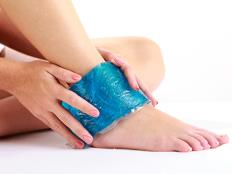But is chasing that finish line feeling setting you up for injury and burnout?
"Racing too often can leave a runner flirting with overtraining," says Dr. Cathy Fieseler, a sports medicine physician in Tyler, Texas. "When the runner is training to race and then racing, chasing a time or place goal, or both, the body is under a great deal of stress."
Here are five signs that your training and racing schedule is too ambitious, plus solutions for how to get back on track.
1. You're exhausted all the time and/or your sleep is disturbed.
1 of 7
Are you sleeping through your morning alarm or dozing off at work, despite getting a full night's sleep? That persistent fatigue is your body's way of telling you to take it easy so it can heal. Poor sleep is also a symptom of too much hard running.
Vigorous physical activity stimulates the body's sympathetic nervous system, which increases your heart rate and gets you revved-up to run. To meet that demand, the body releases cortisol. When stress is constant, the sympathetic system goes into overdrive, and your cortisol levels remain elevated.
"The sympathetic system in overdrive is like taking shots of Red Bull," says Dr. Fieseler. "The longer this chronic stress occurs, the longer the sleep disturbance persists."
Remedy: Rest--not just an easy run day, but an actual rest day. Ongoing fatigue and sleep disturbances should be taken seriously.
"Take a few extra days off each week and stop racing and running hard for at least three weeks," says Heather North, a physiotherapist at Red Hammer Rehab and running coach with Revolution Running, both in Louisville, Colorado. "Even if someone experiencing fatigue runs a mile a day several times a week, the habit is preserved and this is important."
She also recommends getting your blood tested to make sure you aren't suffering from low iron levels or other conditions that can cause fatigue. In extreme cases of exhaustion, Fieseler says you might need to completely stop running and exercising for an extended period until you regain your energy. Lastly, it's also important to evaluate your diet and hydration and make improvements if necessary.
Find:
Your Next Race2. You aren't excited about your races.
2 of 7
You signed up for all those 5Ks and 10Ks, but as the dates approach, your enthusiasm has waned. Instead, you are filled with anxiety as you think about another starting line.
Mental "blahs" that you can't seem to shake are a sure sign that something is awry.
Remedy: Don't beat yourself up for feeling unmotivated. Consider skipping some races, and instead do activities that promote relaxation, such as yoga and meditation. Or maybe sleep in late on the morning of the event, and go for an easy run later in the day instead.
Find:
Your Next Race3. Your race performances are flat or declining.
3 of 7
If you are competing every weekend, your times will drop, right? No, not if your body is still tired from the week before. One of the most frustrating signs of race burnout is a noticeable decline in performance. You might feel like you're pushing yourself to the brink--and you probably are--but the clock doesn't reflect that effort.
Remedy: Re-set your race expectations. Runners shouldn't be afraid to hold back during a race as they work toward a bigger goal.
"You can race as part of normal training, and many athletes do this successfully," says North. "Setting those B races up as preparation for your A races ensures that you don't run too hard all the time, and that you get a solid performance during your A race."
Find:
Your Next Race4. You have nagging leg pain, particularly in one spot.
4 of 7
Repetitive fast running puts great force on your muscles, joints and bones. As a result, one of the most common injuries is a runner's nightmare: a stress fracture. These tiny cracks typically occur in the bones of runners' feet and shins. At first the pain is mild, but gradually gets worse, and radiates from a specific area, which might be painful to touch. It usually subsides during rest.
Remedy: See a doctor for a diagnosis, and be prepared to cross-train for at least six weeks or until the fracture is completely healed. When you return to running, start out slowly and gradually increase your distance and intensity over time.
Find:
Your Next RaceCaramel Apple Smoothie
Crazy for Crust 5 of 7
3/4 cup milk
1/4 cup unsweetened apple juice
1 apple
1 tablespoon sugar-free caramel syrup, more for optional garnish
2 cups ice
Find:
Your Next Race5. You feel overwhelmed about your life in general.
6 of 7
Is your busy race schedule making you feel stressed about work and family commitments? Remember that life's other stressors play a role in how well your mind and body can recover from training.
Remedy: Be flexible about your calendar when other areas of your life get challenging. For example, if you're stressed from work but have a 20-miler on the schedule, consider cutting back. And if you've been awake at night taking care of your sick child, don't force yourself to race that weekend.
"We need to ask ourselves why we run, and is it fun?" North says. "Moderation is key."
Find:
Your Next Race7 of 7
Get ACTIVE on the Go


Couch to 5K®
The best way to get new runners off the couch and across the finish line of their first 5K.
Available for iOS | Android






Discuss This Article